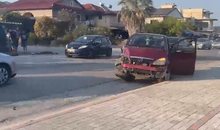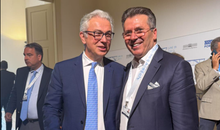
 Flash News
Flash News
"Without transparency, without inclusiveness", the disinformation commission remains a one-sided initiative

As it rose, the works continued. No transparency, no inclusiveness and no representative legitimacy. It is about the parliamentary commission set up against disinformation and foreign interference in democratic processes. At the end of the parliamentary session, this commission lacks the representation of the largest opposition party in the country, as well as a clear and universally accepted field of action.
Parliament officially adjourned on July 25 before the summer recess, to reconvene in September. One of the developments of this session that was "sentenced" to spend the hot August in uncertainty is the disinformation commission. In the absence of representation from the country's largest opposition party, the Democratic Party, and despite US and EU calls for broad consultation and inclusiveness, the socialist majority followed suit without looking back.
Two days before the closing of the work of the assembly, on July 22, the parliamentary commission on disinformation invited the civil society to give its comments on the draft objectives set by this commission. Ironically enough, in the invitation the commission claims that its activity is based on two important principles, inclusiveness and transparency, which in fact is completely absent.
The beginning "in the dark" of the commission
From the beginning, this parliamentary initiative was founded on the lack of transparency and comprehensive processes, a concern raised repeatedly by the parliamentary opposition and civil society. The establishment of the commission was approved only with the votes of the socialists, without having a well-defined field of action and purpose.
The concern for some was even linked to the government's desire to control the media, this time not through a legal package like the internationally blocked anti-defamation, but this time through a parliamentary commission.
After the quick approval of the establishment of the commission on April 11, 2024, silence fell in the halls of the Assembly of Albania regarding this initiative.
Meanwhile, the US State Department told Faktoje that this initiative should include comprehensive dialogue and a broad-based discussion with all Albanians. On the other hand, the European Union stressed that such an initiative should use international expertise, especially from the EU delegation in Tirana, the European External Action Service, the European Commission and the Venice Commission of the Council of Europe.
Despite calls for inclusiveness and dialogue, the majority stood its ground and continued working only with socialist members and two members from small parties, Fatmir Mediu and Mesila Doda.
What does the non-involvement of democrats bring?
The lack of representation of the Democratic Party in the commission is considered problematic by experts.
Opozita duhet të pëfshihet në cdo nismë parlamentare për të siguruar pjesëmarrjen dhe monitorimin e nismave të tilla me interes kombëtar. Në fund, secili grup politik mund të dalë më qëndrime të ndryshme. – tha Erjon Tase për Faktoje.
Edhe për Afrim Krasniqin nisja e punës pa partinë opozitare më të madhe cënon legjitimitetin e komisonit dhe në fund produktit që ai mund të sjellë.
Për sa kohë opozita nuk është pjesë përbërëse, komisoni e ka të pamundur të ketë produkt konsensual dhe që votohet në parlament kur kërkon mbi 84 vota. Ndaj do jetë e detyrueshme të këtë konsensus politik. Vetëm kështu mund të ketë vlerë produkti, përndryshe ai bie sepe nuk krijon besueshmëri. – vlerëson Afrim Krasniqi.
Pavarësisht optimizmit të ekspertëve se sesioni paralmentar do gjejë edhe antarët demokratë të ulur në tryezën e komisionit, Ina Zhupa, kryetare e Komisionit të Medias tha për Faktoje se Partia Demokratike refuzon të bëhet pjesë e një komisioni të imponuar dhe me afat pune të përcaktuar në funksion të zgjedhejve të ardhshme parlamentare.
Ne besojmë se ky komision i ngritur me shpejtësi, në mënyrë të njëanshme nuk adreson një problem global të çështjes së dizinfomimit nga faktorë të jashtëm, sepse atëherë do duhej një zgjidhje gjithëpërfshirëse dhe kombëtare bashkë me të gjithë faktoret, media, shoqeri civile, opozitë, etj. Por ky komision adreson vetëm një problem partiak që ka mazhoranca, që nuk e arriti dot me ligjin anti shpifje, që është të bllokojë dhe ti bej presion mediave, sidomos atyre online dhe rrjeteve sociale, ndaj edhe ka krijuar mekanizmin e komisionit “anti-shpifje”. – tha Ina Zhupa.
Çfarë thonë ekspertët për objektivat e komisionit?
Probleme në objektivat dhe metodologjinë e përcaktuar nga komisioni sheh Afrim Krasniqi nga Instituti i Studimeve Politike. Ai thekson se Shqipëria e ka detyrim adresimin e ndërhyrjeve të huaja dashakeqe në kuadër të NATO-s dhe sigurisë kombëtare, por se ky komision nuk e adreson këtë problem.
Një komision politik parlamentar nuk mund të merret me çështjet e lirisë së shprehjes, mbrojtjen, promovimin apo forcimin e organziatave të shoqërisë civile, si dhe mbështetjen e pavarur të fakteve nga mediat. Nuk është detyra e parlamentit kjo. Madje kur krijohet një komision politik, përfshirja e tij në këtë sektor vetëm sa e cënon lirinë e medias dhe atë të shoqatave të shoqërisë civile. – vlerëson Krasniqi.
Sipas tij, fokusi i komisionit do duhej të ishte më i kufizuar dhe konkret, sipas praktikave të NATO-s, për çështje që kanë të bëjnë me sigurinë kombëtare dhe përgjegjësitë parlamentare, duke u siguruar njëkohësisht që të mos krijojë mbivendosje me komisionin e sigurisë, atë të integrimit apo komisionin e medias.
Për Erjon Tasen rregullimi i problemit do duhet të fillojë nga adresimi i cështjeve të brendshme, për të kaluar më pas tek ndërhyrja e huaj.
The fourth objective, the one on freedom of expression, seems to have a focus on fact checking and public education, but not intervention in the chaotic situation of Albanian portals. I have also expressed my opinion to the commission that without establishing a regulation of the situation in which portals operate and misuse freedom of expression, foreign disinformation cannot be controlled. It is impossible to regulate foreign interference without internal regulation. - explains Erjon Tase.
It seems unclear what awaits the commission in the new parliamentary season. What is known is that the half-assed commission set up to fight disinformation and external interference will wait until October for the opinions of civil society on the draft objectives it has set for itself.
The Institute of Political Studies has refused to give the Assembly an opinion on the draft objectives of the commission, since, as Afrim Krasniqi explains, the work of civil society is not to attach to parliamentary political commissions, but to supervise and give opinions on documents that are the product of these commissions.
Meanwhile, the democrats express their firm position not to become part of what they consider to be "pressure and persecution of the media for electoral reasons in an election year".
"We are open with our partners the USA and the EU, that with the appropriate guarantees, with bottom-up mechanisms, inclusively, we will take the appropriate steps as the Assembly in this direction - disinformation from external factors, but never become part of a one-sided commission with a completely different agenda from the public one." - concludes Zhupa. Faktoje.al
Latest news


Not only the body, swimming also helps the brain
2025-07-05 21:02:49
"Be careful with the water", Alimehmeti warns about the health risks of summer
2025-07-05 20:39:10
PSG beats Bayern Munich 2-0, advances to Club World Cup semifinals
2025-07-05 20:19:38

Two vehicles collide on the Elbasan-Peqin axis, drivers injured
2025-07-05 19:26:29

What does Zelenskyy have more than Zegjineja?
2025-07-05 18:45:26

Fiscal peace, but at a cost
2025-07-05 18:00:10
'Bankers' tax evasion, Chinese CEO and former director jailed
2025-07-05 17:39:21
Kyle Walker joins English club on two-year deal
2025-07-05 17:20:24
Two cars collide on the Saranda-Delvina axis, 4 injured
2025-07-05 17:05:29
Touching gesture! Liverpool will pay Jota's family's salary until 2027
2025-07-05 16:45:18
The zodiac signs that cheat most often
2025-07-05 16:25:53

"I asked for the dismissals", Dredha tries to soften Rama's 'blow' in Vlora
2025-07-05 15:48:49
Bomb threat in Parliament, prosecutor: It was a lie
2025-07-05 15:22:28

Bardhi: The recount revealed how greedy Zeqine Balluku is in stealing
2025-07-05 14:44:29
Knife wound on the secondary road Tirana-Durrës, perpetrator sought
2025-07-05 14:37:54
Tears and pain, Diogo Jota is escorted to his final home
2025-07-05 14:21:34
Success starts with yourself! Simple ways to invest in personal development
2025-07-05 13:58:50
Unlicensed firearms found in apartment, 50-year-old arrested in Lushnje
2025-07-05 13:43:11

Tirana Court remands Skerdi Sina to prison
2025-07-05 12:59:34
Cocaine laboratory in Greece, here are the Albanians arrested and wanted
2025-07-05 12:40:16
Directed Justice/Vangjeli: SPAK does not investigate any scandal involving Rama
2025-07-05 12:22:03

Bomb alert, Police remove MPs and media from Kosovo Parliament building
2025-07-05 11:48:16
"The will of the people" and the irony of ordered resignations
2025-07-05 11:32:05
Summer drowning risk: How to enjoy the water without risking your life
2025-07-05 11:20:27
Fire situation in the country, 16 fires reported in 24 hours, 4 still active
2025-07-05 11:07:04
Car hits pedestrian at white lines, injured in serious condition in Vlora
2025-07-05 10:59:58
Mosquito-borne diseases are a growing problem in Europe
2025-07-05 10:44:13



One of Sweden's most dangerous and wanted criminals arrested in Turkey
2025-07-05 09:38:29
Foreign exchange/ How much foreign currencies are bought and sold today
2025-07-05 09:18:38

"Don't be influenced by the opinions of others", today's horoscope
2025-07-05 08:40:50

Morning Post/ In 2 lines: What mattered yesterday in Albania
2025-07-05 08:02:07

Trump says he's ready to raise tariffs to 70% on some countries
2025-07-04 22:35:52
Tre shenjat e zodiakut që do ‘pasurohen’ në Korrik
2025-07-04 22:05:09
Gaza War: Hamas Accepts US Proposal for 60-Day Ceasefire
2025-07-04 21:50:10
Autocracy in Albania, Fuga: Governance has gotten out of control
2025-07-04 21:40:51
Meta: Agriculture on credit, the new fraud!
2025-07-04 21:26:39




Vote recount in Durrës ends without changes
2025-07-04 20:12:54
Gas station explodes in Rome, 25 injured (VIDEO)
2025-07-04 20:00:20

These afternoon habits often sabotage weight loss
2025-07-04 19:39:28
Former Arsenal player Thomas Partey accused of rape
2025-07-04 19:24:21
Shepherd disappears without a trace in Delvina
2025-07-04 19:14:31

Bardho gave Zegjine's mandate/Braho: Unfair! It violates the electoral system
2025-07-04 19:01:08


Rapid developments in the Sultanates!
2025-07-04 18:00:06



Italy tightens rules for skateboard traffic
2025-07-04 17:20:18

Unusual for the time, dense fog covers the coast of Vlora
2025-07-04 16:48:01


Accident on the Shkodra-Lezhë axis, one dead and 3 injured
2025-07-04 16:14:19
Albania with fewer requests for asylum and Albanian citizenship in 2024
2025-07-04 16:06:57

Albania last for quality of life, DP: Technical government is the solution!
2025-07-04 15:42:30
Nico Williams says "No" to Barcelona, signs with Athletic Club until 2035
2025-07-04 15:33:35
Fires in the country, four fires are still active, what is the situation?
2025-07-04 15:24:20

Summer brings big changes for these 4 zodiac signs
2025-07-04 15:00:04
Osmani: MPs need to agree to a secret ballot for the Speaker of Parliament
2025-07-04 14:51:09
Serious accident on the Peqin-Elbasan axis, two injured
2025-07-04 14:37:56

GJKKO leaves in force the security measure for the head of the KPP
2025-07-04 13:58:17
Who will replace Ilir Meta and take over the leadership of the PL?
2025-07-04 13:50:36
Berisha: Dismissal of directors in Vlora, another act of 'scapegoats'
2025-07-04 13:41:46




Librazhd/ In a serious psychological state, the young man consumes pesticides
2025-07-04 13:05:07


Weapons trafficked from Kosovo to Albania, two arrested, 8 pistols seized
2025-07-04 12:33:28
Konsumimi i tepërt i çokollatës, ja cilat janë dëmet që shkakton në organizëm
2025-07-04 12:23:35

Fires in the country, 21 fires in the last 24 hours, 4 still active
2025-07-04 12:00:19
WB calls for debt transparency: Albania to publish details of every loan
2025-07-04 11:50:05
